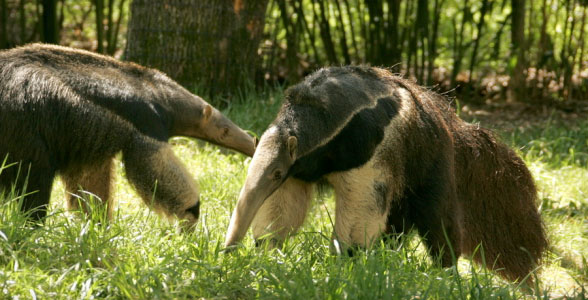By Sandra Harbison, Photography by Christian Sperka
Never one to turn up her nose at a good medical mystery, Dr. Melissa Kennedy—along with her lab mates at the UT College of Veterinary Medicine—has helped identify herpes virus in Asian elephants, was the first to publish that equine herpes could affect gazelles, and now is the first to diagnose influenza in giant anteaters. And that’s nothing to sneeze at.
Kennedy, a veterinarian and clinical virologist with a UT Ph.D. in comparative and experimental medicine and an associate professor at the college, received a call from Nashville Zoo veterinarian Dr. Sally Nofs, who was concerned about a 12-member colony of giant anteaters, a near-threatened species. An outbreak of respiratory disease had swept through the group, affecting all 11 adults. They suffered severe nasal discharge and congestion, poor appetite, and lethargy. Kennedy’s lab needed samples for testing. Nasal samples. From the giant anteaters.
The virology lab at the veterinary college utilizes an electron microscope, a piece of expensive equipment usually only found in academic and research institutions used to identify unknown viruses. Since performing diagnostic work for exotic species is not a moneymaker, not many commercial laboratories are equipped to do it. Kennedy says it’s part of the responsibility of a land grant institution. “We service communities locally, regionally, nationally, and internationally helping them with infectious disease problems. Otherwise, they might not have anyone else to turn to for assistance.”
Once the samples from the giant anteaters reached the lab, the hunt was on and history was made. After isolating the virus from the samples, extensive testing with the electron microscope as well as genetic sequencing showed the anteaters were infected with a human influenza virus–they had the flu. Kennedy says the impact on civilization is minimal, but it shows how adaptable the wily viruses are.
“Just when you think you’ve got them figured out, they’ll do something different.”
Kennedy admits she harbors a healthy respect for viruses. “I think they are way cool, but I’m weird,” she laughs and then explains they are the ultimate survivors that become intimately involved in the cells they target. “Viruses don’t set out to kill their host because they are so dependent upon the cell. They’re opportunistic and design ways to elude the host’s defense systems and use the cell to their advantage. It’s amazing.” Kennedy says all they’re really trying to do is survive and reproduce.
As word of the discovery spreads, management of giant anteaters is changing. “Given the contagious nature of the influenza virus, caretakers with respiratory disease should be restricted from caring for giant anteaters,” Kennedy says. And advice to humans with the flu, in addition to the standard “cover your mouth when you cough and remember to wash your hands,” now includes a third admonishment: “Stay away from anteaters.”



